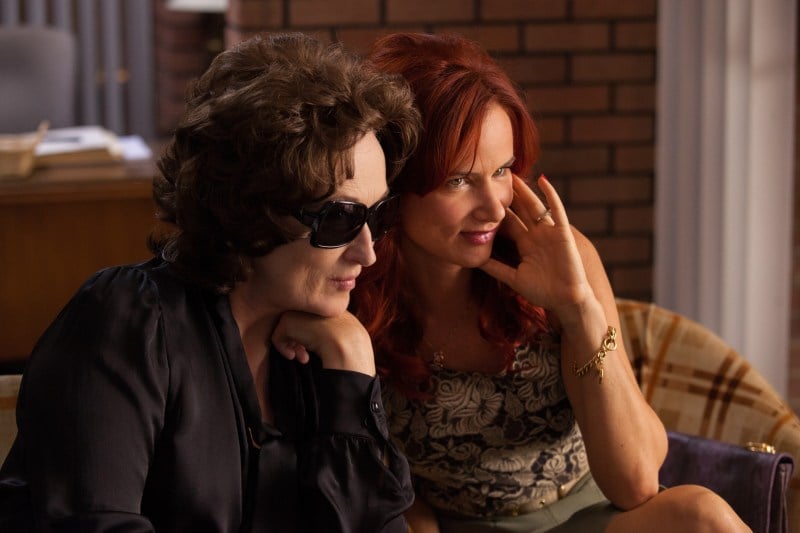“August: Osage County,” John Wells’ film adaptation of the Pulitzer Prize-winning play by Tracy Letts, opens with a monologue in which Bev Weston (Sam Shepherd) sums up his marriage: “My wife takes pills, and I drink,” he says, “that is the bargain we’ve struck.” It is also the bargain he breaks, when he disappears and, apparently, takes his own life. “August: Osage County” is a portrait of the family he leaves behind — its dysfunction and self-immolation.

The film takes place almost entirely in the Westons’ dilapidated house in northeastern Oklahoma. Bev and his wife, Violet (Meryl Streep), have been living — or, rather, dying — in the house for years. Violet is a cancer victim, whose pain has driven her to depression, pills, insolence. Bev was a poet, a one-hit wonder who committed his life to drinking following the success of his first book, “Meadowlark.”
When Bev goes missing, the couple’s extended family descends on the house, including their three daughters (Julia Roberts, Juliette Lewis and Julian Nicholson) and their respective partners (Ewan McGregor, Dermot McGregor and Benedict Cumberbatch). Everyone brings his or her own grudges, vices and heartaches to the family living room. Explosion ensues.
During a marathon family dinner, Violet lashes out at each and every guest, hitting each of them where it hurts most. She bashes her deceased husband, makes a play for his bequest and accuses her children of squandering their privilege. Streep’s performance is remarkable. She bites her nails, sings to herself and gesticulates wildly. Violet is at once deranged and lucid; through it all, she maintains a knack for illuminating the family secrets no one knows she knows. By the end of the dinner, Violet and her daughter, Barbara (Roberts), are wrestling, thrashing and scratching each other on the floor.
It is understandable, then, that the film’s cast has been criticized for its Oscar-greedy melodrama. To me, though, the movie’s shamelessness and volume are part of its value. Like Violet’s commitment to “truth-tellin” at the dinner table, Tracy Letts wrote a play that stripped the American family of affect and exposed its skeletons. Its onscreen rendition does his project justice.
As it turns out, Westons’ secrets run the gamut from divorce and adultery to incest and pedophilia, but substance abuse — of marijuana, alcohol, prescription pills — is the most destructive of all. The characters’ attempts to self-medication are desperate and unsustainable. Drugs make everything worse.
In face of the unfolding drama, the Westons are visited by at least one good grace: Before his departure, Bev hires Johnna (Misty Upham), a Native American, to work as a cook, housekeeper and caretaker. She witnesses the family’s unhinging, yet, in a moment of impending catastrophe, defends its honor.
Here, the film seems to point to yet another, collective “secret” at the heart of the American family, the genocide of Native Americans. On this note, the film is uncharacteristically subtle, posing more questions than it answers about the toxic legacy of this atrocity for the American family.
While I can imagine that the story is better realized on stage than on screen, the movie still merits respect, applause and attendance. Its themes are familiar not just because they have been staged before but also because they are truthful: Our crimes against each other accumulate in silence and, eventually, explode. Reconciliation is elusive and, simultaneously, a matter of life or death.
